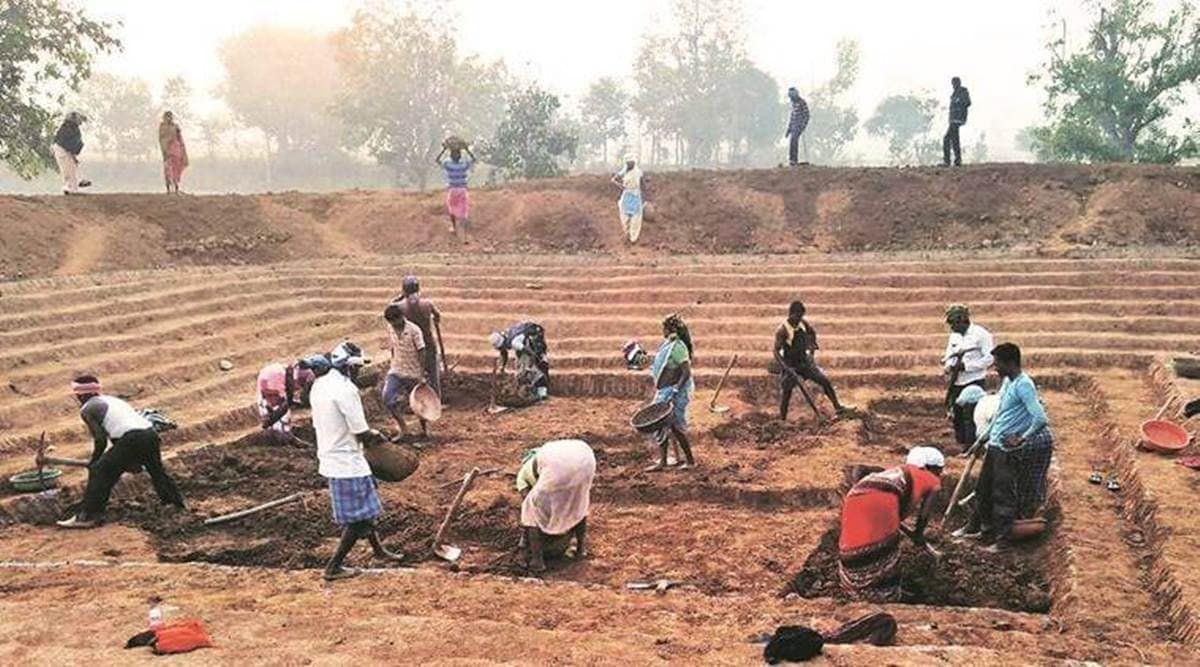 The recommendation comes at a time when the job scheme has become a safety net for migrant workers who returned to their villages during Covid-19, and the demand for work under it reached an all-time high in the last financial year.
The recommendation comes at a time when the job scheme has become a safety net for migrant workers who returned to their villages during Covid-19, and the demand for work under it reached an all-time high in the last financial year. OBSERVING THAT the Mahatma Gandhi National Rural Employment Guarantee Act (MGNREGA) is a last “fall-back” option for many in the rural areas, a Parliamentary committee has recommended increase in guaranteed days of work from 100 to 150 under the rural job guarantee scheme.
The recommendation comes at a time when the job scheme has become a safety net for migrant workers who returned to their villages during Covid-19, and the demand for work under it reached an all-time high in the last financial year.
In its report, which was tabled in Lok Sabha on Tuesday, the Standing Committee on Rural Development and Panchayati Raj, headed by Shiv Sena member Prataprao Jadhav, also said that the budgetary allocation of a scheme of “such enormous magnitude” should be done in a more “pragmatic manner” so that there is no dearth of funds in mid-year and flow of funds for payment of wages and material share is maintained seamlessly.
In Union Budget 2022-23, there was no increase in the allocation for MGNREGS, with the Finance Ministry retaining it at Rs 73,000 crore for the next fiscal year.
On the demand for increase in the number of guaranteed days of work under the MGNREGS, the panel said, “The committee take note of this existing provision and are of the view that MGNREGA is a last ‘fall back’ option for numerous rural people and the amount of expenditure under it also elicits a keen interest in the scheme by the poor and marginalised.”
Job scheme in demand
THE STANDING committee has reviewed the implementation of the MGNREGA at a time when the scheme has seen unprecedented demand for work. In the last financial year, 389.1 crore persondays were generated and 7.55 crore households (11.19 crore individuals) availed the scheme. Besides the budgetary allocation, the scheme faces several issues such as demand for linking of wage increase with Consumer Price Index (CPI) instead of CPI-AL (Agricultural Labour), which has a very old base. In addition to this, there have been demands for allowing agricultural work under MGNREGA.
“It is high time that the scheme be revamped keeping in view the changing times and emerging challenges particularly in wake of the Covid pandemic… In view of such background, the committee are of firm opinion that the ‘need of the hour’ is to further diversify the nature of works under MGNREGA in such manner and through such mechanisms which could also propel the number of guaranteed working days under MGNREGA to at least 150 days from the current 100 days,” it said in its report, “Critical Evaluation of Mahatma Gandhi National Rural Employment Guarantee Act”.
“Therefore, the committee strongly recommend the Department of Rural Development to review the scheme of MGNREGA in such a way which could ensure an increase of guaranteed days of work from 100 to 150 days,” it said.
The committee also recommended the Rural Development Department to “review its budgetary demand pertaining to MGNREGA and ensure that ‘agreed to labour budget’ is made at concerned level keeping in view the expenditure of previous years”.
“The committee find that since its inception and particularly during the last 4-5 financial years, it has been seen through the analysis of its Budget Estimate (BE) that each time there has been a substantial hike at the Revised Estimate (RE) stage, further augmenting the budgetary allocation of the scheme,” the panel said. Citing NREGS allocation figures for recent years, it said, “In the financial year 2018-19, the BE was hiked from Rs 55,000 crore to Rs 61,830.09 crore, from Rs 60,000 crore to Rs 71,001.81 crore in 2019-20, from Rs 61,500 crore to Rs 1,11,500 crore in 2020-21, while during the ongoing financial year 2021-22, from the allocated BE of Rs 73,000 crore, Rs 52,228.84 crore have already been spent by 01.09.2021 i.e. in only six months.”
“Thus, the committee are of the view that the scheme is definitely showing an increase in demand… Moreover, it is also quite perplexing as to the rationale behind keeping the BE for 2021-22 at Rs 73,000 crore while in the previous financial year, the expenditure was to the tune of Rs 1,11,170.86 crore,” it said.
“Even after acknowledging the fact that the last financial year 2020-21 witnessed a surge in demand due to reverse migration of workers from urban areas back to rural locations and their dependence on MGNREGA as a last resort of solace and also taking note that MGNREGA is a demand driven scheme, the committee are still of the view that Budgetary Allocation of a scheme of such enormous magnitude should be done in a more pragmatic manner so that there is no dearth of funds in mid-year and flow of funds for payment of wages, material share, etc. is maintained seamlessly,” the panel said.
- The Indian Express website has been rated GREEN for its credibility and trustworthiness by Newsguard, a global service that rates news sources for their journalistic standards.

